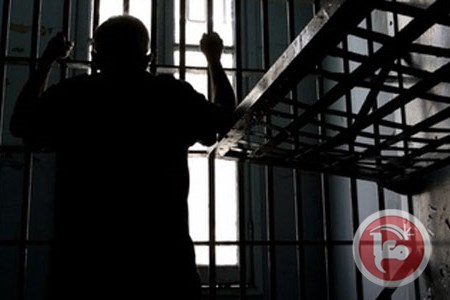
BETHLEHEM (Ma’an) — Ten new Palestinian prisoners on Sunday joined a mass open hunger strike in solidarity with prisoner Bilal Kayid, according to Issa Qaraqe, the head of the Palestinian Committee of Prisoners’ Affairs, a day after reports emerged that Kayid’s health had sharply deteriorated after almost 50 days without food.
Qaraqe told the official Palestinian news agency Wafa that ten prisoners from Israel’s Ramon prison had joined the open strike, including Popular Front for the Liberation of Palestine (PFLP) leader Ahmad Saadat, who was reportedly moved to solitary confinement after joining the strike, according to the Palestinian Prisoner’s Society.
Kayid, a member of the PFLP, Palestine’s most popular left-wing political faction, has been on hunger strike for 47 days in protest of being placed in administrative detention — Israel’s controversial policy of internment without charge or trial under undisclosed evidence — on the day he was scheduled to be released after completing a 14-and-a-half-year prison sentence.
He is one of the most high-profile hunger strikers since Palestinian journalist Muhammad al-Qiq came near death during a 94-day hunger strike before he was finally released in May.
Kayid is currently being treated at Israel’s Barzilai Medical Center in Ashkelon, reportedly in serious condition after his health severely deteriorated on Saturday, resulting in the loss of 90 percent of his ability to speak.
Kayid, a resident of the town of Asira al-Shamaliya in the northern occupied West Bank district of Nablus, was originally detained in 2002 for alleged involvement in the Abu Ali Mustafa Brigades — the armed wing of the PFLP.
Hundreds of PFLP-affiliated prisoners have staged several solidarity mass hunger strikes to demand Kayid’s release, while 33 prisoners announced an open hunger strike in solidarity with Kayid on July 18, and more than a dozen joined over the following days. The mass hunger strikes were declared alongside announcements by Palestinian factions that protests would continue to escalate in the coming weeks to demand Kayid’s release.
Qaraqe highlighted in a statement that around 100 Palestinian prisoners began solidarity hunger strikes in different Israeli prisons in support of Bilal Kayid and the Balboul brothers, who have been on hunger strike for 26 days to protest their administrative detention orders that were issued in early June, just two months after their 14-year-old sister was detained for allegedly possessing a knife while trying to cross a checkpoint into Jerusalem.
As a result of the mass solidarity hunger strikes, the Israeli Prison Service (IPS) has cracked down in a number of ways on prisoners, particularly those affiliated with the PFLP.
A lawyer from the Palestinian Committee of Prisoners’ Affairs said last week that IPS officers raided the cells of the hunger-striking prisoners and transferred prisoners to other Israeli jails in an attempt to separate the prisoners and force them to end their strikes.
According to the statement, IPS officials also imposed punishments on Palestinians participating in the strike, including placing them in solitary confinement, confiscating their personal belongings and electric devices, enforcing financial penalties of 600 shekels ($156), and depriving the prisoners of family visitations for two months.
A decision by the IPS on Friday to ban Ma’an TV — which broadcasts many programs directed to Palestinian prisoners — from playing inside Israeli prisons has been highly criticized, with many saying the move was made to disconnect Palestinian prisoners from the outside world and strip them of their rights.
A number of sit-in strikes have been set up across major cities in the occupied West Bank, with several local and foreign delegations visiting the Bethlehem tent in the past few days to show solidarity, including Palestinian Prime Minister Rami Hamdallah, a delegation of 200 people from different European countries, and an official delegation from Saudi Arabia.
The tent was installed last week to call attention to the now hundreds of hunger-striking Palestinian prisoners protesting Israel’s policy of administrative detention, which Palestinians say is used to detain family members of Palestinian political leaders, in an extension of several policies that rights groups have deemed “collective punishment” aimed at disrupting family life for Palestinians in the West Bank and East Jerusalem.
According to prisoners’ rights group Addameer, 7,000 Palestinians were being held by Israel as of May, 715 of whom were held in administrative detention.




